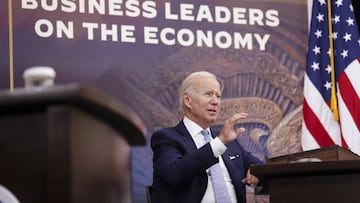There will be a recession in 2023 according to experts
With inflation still high and many other antions struggling economically people are expecting a recession in the US for 2023.


Financial experts are worried the continued interest rate increases in the US as recent announcements from the Federal Reserve seem to be pushing for them, despite inflation slowing down in July.
“We will have a recession because we’ve had five months of zero M2 growth–money supply growth, and the Fed isn’t even looking at it,” Steve Hanke, a professor of applied economics at Johns Hopkins University, said in an interview with CNBC on Monday. “We’re going to have one whopper of a recession in 2023.”
M2 is a measure of money supply and future inflation.
Powell's speech is consistent with the "tough talk" on inflation. Fed wants to see looser job market (higher unemployment/weaker wage growth), is okay with a recession. Our view remains: The more the Fed tightens up front, the more the yield curve inverts. pic.twitter.com/jgnrfeJTg3
— Kathy Jones (@KathyJones) August 26, 2022
The definition of a recession according to the National Bureau of Economic Research (NBER), considered the ultimate arbitrators of what is and is not a recession, “three criteria—depth, diffusion, and duration—needs to be met individually to some degree, extreme conditions revealed by one criterion may partially offset weaker indications from another.”
Central to the coming recession is the Federal Reserves insistance on picking up interest rates. So far there have been four rises in 2022 and another due in September which would take interest rates to their highest in years. Rising interst rates keep inflation down by encouraging people to save and businesses to stop investing, in effect slowing down spending by forcing people to spend less money.
Will interest rates help battle inflation or cause more problems?
While this is a usual measure to stop inflation, the main drive on inflation in the US is not spending but a lack of availability of crucial supply chain components, including items as mundane as shipping containers. Also, Fed. Chief Jerome Powell has consistently attacked “a tight labour market”, economist speech for low unemployment, and has said the number of people in work needs to rise to 4 percent to lower inflation.
Currently, unemployment stands at 3.5 percent. Although may appear slight, that correlates to nearly 330,000 more people unemployed. Some economists are arguing for 6 percent unemployment which would certainly spell a recession with millions more out of work.
Former Treasury Secretary Larry Summers told POLITICO: “Unless we have a set of very surprising and positive developments we’re not likely to see the inflation rate come all the way down to [the Fed’s] target without there being some level of meaningful economic distress.”
Related stories
Wages have grown by less than five percent since last year but inflation has hit more than nine percent. If wages and a tight labour market were causing inflation then prices would be higher as noted by former Secretary of Labor Robert Reich.
How can wages be pushing up prices if wages grew 5.6 percent over the past year and prices rose 8.5 percent? Do the math. Adjusted for inflation, wages have actually dropped 2.7 percent.
— Robert Reich (@RBReich) April 12, 2022
Jerome Powell and the Fed: Where's the "tight" labor market you're so worried about?
Food prices are also being kept high by a lack of exports from Ukraine and Russia, two countries key for the world food economy. Currently, they are 10.9 percent higher than in July 2021. Restricting consumer spending power will do little to stop these prices rising and may actually prevent Americans from accessing food they need to subsist.

